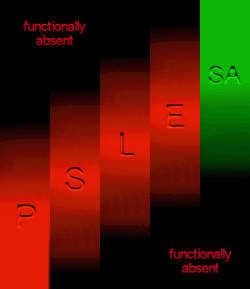Maslow's Needs Hierarchy

|
P = Physiological |

|
A person's level of gratification within this hierarchically integrated framework would be represented by a horizontal line across all needs, and growth would be represented by that horizontal line moving upwards through all needs.
NOTE: THE SCHEME MASLOW PROPOSES MIGHT BE REGARDED BY STATISTICIANS AS AN ORDINAL SCALE AND IS NOT READILY AMENABLE TO QUANTIFICATION. It's value is primarily heuristic, that is, this is the general idea, the overall shape. Maslow's theory is weak on exact points of transition. You can (and he does) for illustrative purposes speak of someone being 85% satisfied in physiological needs, for instance, but so far as I know there isn't a test which provides a quantified measure of gratification across needs. |
Physiological Needs - Food, water, oxygen, etc. Anything the physical organism needs to survive. Very fundamental life or death needs. Perhaps because Maslow was well fed, he didn't spend a lot of time on these. "...it seems impossible as well as useless to make any list of fundamental physiological needs, for they can come to almost any number one might wish, depending on the degree of specificity of description." (MP 16).
Safety Needs - "If the physiological needs are relatively well gratified, there then emerges a new set of needs, which we may categorize roughly as the safety needs, (security; stability; dependency; protection; freedom from fear, anxiety, and chaos; need for structure, order, law, and limits; strength in the protector; and so on)." (MP 18, emphasis mine)
Belongingness and Love Needs - "If both the physiological and the safety needs are fairly well gratified, there will emerge the love and affection and belongingness needs, and the whole cycle already described will repeat itself with this new center. The love needs involve giving and receiving affection. When they are unsatisfied, a person will feel keenly the absence of friends, mate, or children. Such a person will hunger for relations with people in general - for a place in the group or family - and will strive with great intensity to achieve this goal. Attaining such a place will matter more than anything else in the world and he or she may even forget that once, when hunger was foremost, love seemed unreal, unnecessary, and unimportant. Now the pangs of loneliness, ostracism, rejection, friendlessness, and rootlessness are preeminent." (MP 20)
Esteem Needs - "All people in our society (with a few pathological exceptions) have a need or desire for a stable, firmly based, usually high evaluation of themselves, for self-respect or self-esteem, and for the esteem of others. These needs may therefore be classified into two subsidiary sets. These are, first, the desire for strength, achievement, adequacy, mastery and competence, confidence in the face of the world, and independence and freedom. Second, we have what we may call the desire for reputation or prestige (defining it as respect or esteem from other people), status, fame and glory, dominance, recognition, attention, importance, dignity, or appreciation." (MP 21, emphases mine)
"Satisfaction of the self-esteem need leads to feelings of self-confidence, worth, strength, capability, and adequacy, of being useful and necessary in the world. But thwarting of these needs produces feelings of inferiority, of weakness, and of helplessness." (MP 21)
"The most stable and therefore most healthy self-esteem is based on deserved respect from others rather than on external fame or celebrity and unwarranted adulation." (MP 22, original emphasis)
Self-actualization Need - "Even if all these needs are satisfied, we may still often (if not always) expect that a new discontent and restlessness will soon develop, unless the individual is doing what he or she, individually, is fitted for. Musicians must make music, artists must paint, poets must write if they are to be ultimately at peace with themselves. What humans can be, they must be. They must be true to their own nature. This need we may call self-actualization." (MP 22, original emphases. See also MP chaps 11, 12, 13. Maslow later redefined self-actualization as a function of frequency of peak experiences).